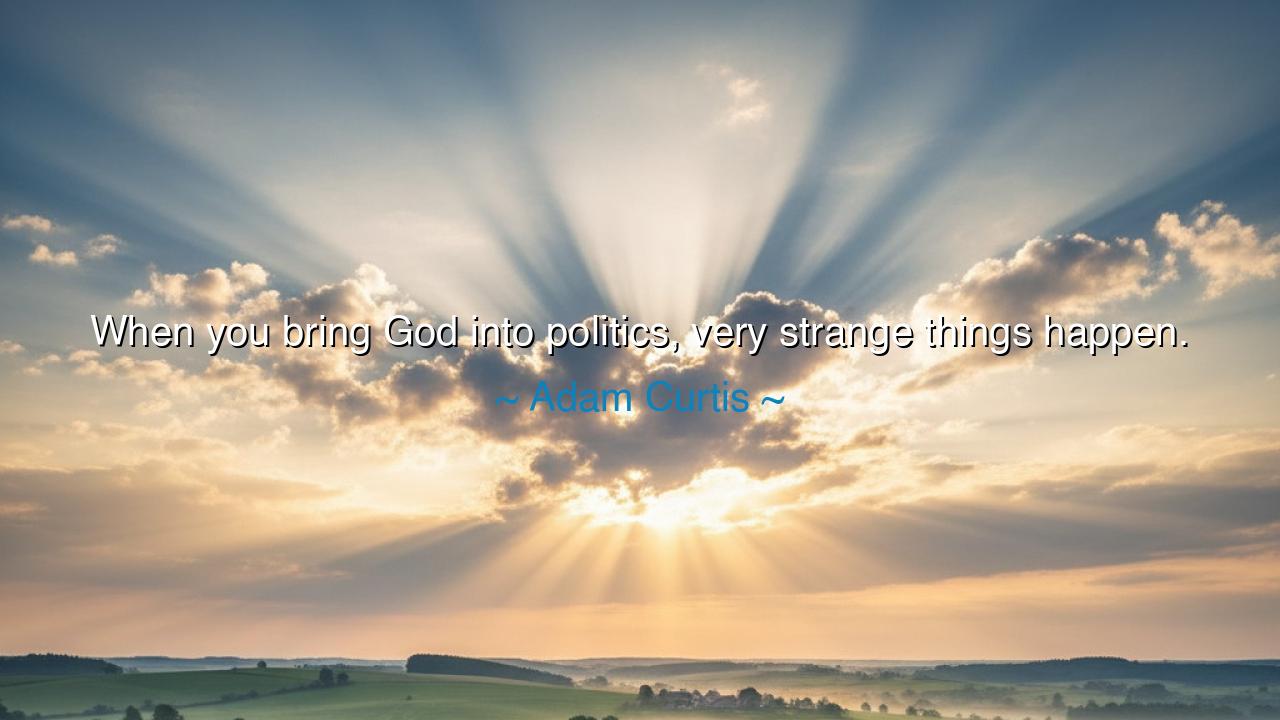
When you bring God into politics, very strange things happen.






O Seekers of Truth and Wisdom, heed the cautionary words of Adam Curtis: "When you bring God into politics, very strange things happen." In this powerful statement, Curtis warns us of the danger that arises when the sacred is used to justify the actions of the state. To invoke the divine for earthly purposes is to risk distorting the true nature of both faith and politics. The blend of spirituality and power can lead to corruption, manipulation, and the creation of systems that claim divine authority but serve only the ambitions of those in power.
Consider, O Children, the lessons of history, where rulers have sought to justify their actions by claiming the will of the gods. The use of religion to solidify political power has often led to tyranny and injustice. When God is invoked as a tool of political domination, the true message of faith becomes lost, distorted by the interests of those who wish to control the masses. The claim to divine mandates becomes a means of subjugating the people, masking human ambition under the guise of divine will.
Look to the example of the Crusades, when European monarchs and church leaders, in the name of Christianity, led their people to war in a brutal campaign to reclaim the Holy Land. They proclaimed the will of God, urging their followers to fight and kill in the name of faith. Yet the true motivations of these rulers were often political and economic, as they sought to expand their kingdoms and power. The mixing of religion with politics led to bloodshed and suffering, as the sacred became tainted by the profane, and the will of the people was bent to the whims of the powerful.
And so, O Seekers, let us understand the danger of mixing the divine with the earthly. While faith is a guiding light, it must never be used as a tool for political gain. When rulers and politicians invoke God to justify their actions, they risk turning sacred principles into weapons of oppression. Curtis teaches us that the true purpose of faith is to guide the soul, to inspire virtue and compassion, not to be twisted into a means of controlling others. God does not serve as a pawn in the game of politics, for such a union leads to strange and often dangerous consequences.
Let us, therefore, tread carefully when faith and politics intertwine. Let us remember that true power does not come from claiming divine authority, but from justice, wisdom, and the common good. The people must never be led astray by the false claim that God supports the ambitions of rulers who seek only to empower themselves. Let the sacred and the earthly remain separate, for when they are merged, the truth of both becomes obscured, and the path to justice becomes clouded by falsehoods.






HPthuy hien pham
Here’s my practical concern: democratic debate needs contestable claims. Appeals to revelation aren’t easily argued with, which can freeze compromise. Would a norm help where leaders disclose their moral roots but ground proposals in evidence, rights, and consequences? Could that preserve integrity without sidelining the faithful? I’m asking for a workable test: if a policy’s rationale can’t be translated into terms nonadherents can accept, should it advance? If not, what counts as a good translation?
AAlanWalker
Part of me thinks faith can nourish public life—shaping compassion, mercy, and solidarity. Yet history shows that when metaphysics becomes a mandate, dissent can be recast as heresy. Can spiritual conviction coexist with robust pluralism if policy is justified with reasons that don’t require shared belief? I’d love examples where interfaith or secular frameworks channeled religious energy into common goods without coercion. What practices made that balance sustainable rather than fragile and contingent?
TTDinh Thi Thuy Trang
I’ve watched campaigns wrap themselves in religious language, and I worry about sincerity versus strategy. How do citizens tell the difference between genuine conscience and opportunistic branding? Should candidates be expected to articulate policy in terms that any voter—believer or not—can evaluate? I want a perspective on where respect for devotion ends and theocracy begins. Is there a principled boundary that protects freedom of worship while preventing laws that privilege a single creed?
IYIsagi Yoichi
As a reader, I’m torn between the moral clarity faith can offer and the chaos that can follow when leaders claim divine sanction. In plural societies, who adjudicates competing revelations or sacred texts? What guardrails keep a majority’s devotion from erasing minority rights? I’m curious whether the safest path is keeping spiritual motivations private while translating them into publicly accessible reasons. Or is that just a polite fiction that strips belief of its depth and force?